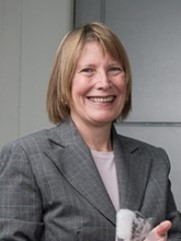 I grew up in a trailer park where job expectations were focused on 7-11. My best friend wanted to be a key punch operator (you’ll have to look this up). There were two incredible boys always ranked ahead of me in school and I went to college on an athletic scholarship (fencing). In other words, I was a good student but not necessarily predestined for excellence. It was useful to have an internal driving force, not outside validation.
I grew up in a trailer park where job expectations were focused on 7-11. My best friend wanted to be a key punch operator (you’ll have to look this up). There were two incredible boys always ranked ahead of me in school and I went to college on an athletic scholarship (fencing). In other words, I was a good student but not necessarily predestined for excellence. It was useful to have an internal driving force, not outside validation.
It’s hard to guess what led to me being cited as a pioneer by this group. I didn’t have a perfect life plan. I went to medical school to be more competitive for grants, not because I thought I would ever see patients. I started in Neurology but the field of molecular biology was just starting and that seemed hugely cool but I had to switch to immunology to do it. I was very sure I would do Internal Medicine but clearly chose Pediatrics. Career zigs and zags can be useful I think, a focusing of one’s goals.
 Perhaps you know me through my work on 22q11.2 deletion syndrome. If so- that came about as an accident. The previous immunology faculty member assigned to work with the genetics group could no longer do it and they needed someone new. Over 20 years later, that research has been my calling card. Lesson 1: keep an open mind about opportunities.
Perhaps you know me through my work on 22q11.2 deletion syndrome. If so- that came about as an accident. The previous immunology faculty member assigned to work with the genetics group could no longer do it and they needed someone new. Over 20 years later, that research has been my calling card. Lesson 1: keep an open mind about opportunities.
 Perhaps you know me through one of the summer schools. This is one of the most gratifying and enriching things that I do each year. My role in the CIS summer school wasn’t an accident but it was surely serendipity that put me in the line of vision when a co-director was being discussed. Lesson 2: Make yourself visible so your name will be in peoples’ minds. Speak up at meetings, talk to people during the coffee breaks, don’t be shy at poster sessions, and volunteer for activities. It’s worth extra work for a good career opportunity. Perhaps you feel unsure of yourself and intimidated. Everyone does. However, once you push yourself out of your comfort zone, you will gain confidence and the next time is easier.
Perhaps you know me through one of the summer schools. This is one of the most gratifying and enriching things that I do each year. My role in the CIS summer school wasn’t an accident but it was surely serendipity that put me in the line of vision when a co-director was being discussed. Lesson 2: Make yourself visible so your name will be in peoples’ minds. Speak up at meetings, talk to people during the coffee breaks, don’t be shy at poster sessions, and volunteer for activities. It’s worth extra work for a good career opportunity. Perhaps you feel unsure of yourself and intimidated. Everyone does. However, once you push yourself out of your comfort zone, you will gain confidence and the next time is easier.
When I was just starting, I went to a talk by Dan Kastner. He had just discovered the MEVF gene in Familial Mediterranean Fever. He spent the first five minutes talking about the wrong paths he had taken along the way to his discovery. It was very empowering to hear someone so successful talk about his failures. THERE WILL BE FAILURES. Lesson 3: Give yourself permission to fail. Learn the lessons, move on, and don’t spend negative energy beating yourself up. If I had to change one career strategy, it would be thinking that my lab should be the leader on every project. I had a bad collaboration early on where I was taken advantage of and it made me unwilling to collaborate for many years. Today, most science and nearly all clinical research requires a network and building those bridges early would have been foundational for some of the work I do now.
A few gender-specific thoughts are in order given the mission of this group. I have many traditional female traits. I’m a builder of consensus, I  lead by example, I try to build trust and forge community. But- niceness must not be mistaken for weakness. It is possible to be simultaneously fierce, supportive, and pleasant. Maybe that is not your personality. Great! I don’t want you to be like me. I want you to be better and to succeed by being you.
lead by example, I try to build trust and forge community. But- niceness must not be mistaken for weakness. It is possible to be simultaneously fierce, supportive, and pleasant. Maybe that is not your personality. Great! I don’t want you to be like me. I want you to be better and to succeed by being you.

BACK